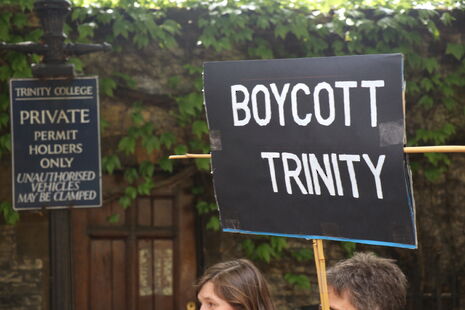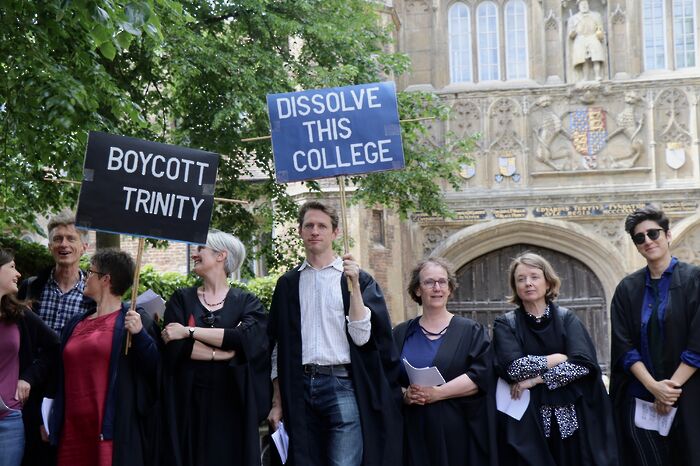UCU boycotts Trinity in wake of pensions scheme exit as three fellows resign
Fellows of Trinity College voted against reconsidering the College Council’s decision to exit the national pensions scheme. Now, UCU has announced a boycott of the College, and three Fellows have resigned

The University and College Union (UCU) has announced the implementation of its strongest sanction against Trinity College following a Fellows vote which saw a motion to reconsider the College’s decision to exit the USS, the national higher education pensions scheme, defeated by 73 to 43 last week. UCU now calls on higher education staff “across the globe” to halt all academic participation with Trinity in an official boycott of the College.
The boycott could entail asking higher education staff worldwide not to organise or partake in conferences, to apply for jobs or give lectures, or to take on positions as visiting academics or external examiners at Trinity, as well as not writing for academic journals “edited from Trinity”.
Three Fellows of the College, two in English and one in History, have also resigned from their posts in the wake of Trinity’s exit from the national pensions scheme, officially called the Universities Superannuation Scheme (USS).
A boycott is the strongest sanction UCU can take. The Union has only once implemented it in the past, against London Metropolitan University in 2009.
Professor Catherine Barnard, Senior Tutor of Trinity College, previously told Varsity that the College had entered into legal agreement to leave the pensions scheme prior to the fellows’ vote, meaning that the decision was not retractable.
Rory Landman, Senior Bursar of Trinity, said in a statement that the exit “was not a decision taken lightly by the College Council”, and believes that the decision has “helped to ensure Trinity’s continued and substantial financial support to the whole of Collegiate Cambridge.”
Trinity College did not respond to Varsity’s questions on actions regarding the staff resignations.
Cambridge UCU chairperson Dr Sam James told Varsity that the branch welcomes the censures and believes that these measures “will build on the local boycott of discretionary labour - emphasising that strength of betrayal that many feel across the University sector”.
An open letter criticising the College’s decision and threatening to withhold all academic labour from Trinity unless it reverses its decision to exit USS has reached over 500 signatures within the University community. Its signatories have pledged not to supervise Trinity students, or to engage in research with the College.
“Trinity have chosen to isolate themselves from longstanding structures of collegiality and mutual support in UK Higher Education,” said Dr James, “and it is appropriate that the College be made to realise the seriousness of that decision.”
He argued that Trinity has had “ample opportunity” to overturn the College Council’s decision or to gather more information on possible alternatives, but did not take them up. He furthered that “others may follow” in the footsteps of the three resignations.
Paul Bridge, UCU’s Head of Higher Education, argued that the risk posed to Trinity’s reputation by the UCU boycott surpasses what he deemed the “tiny” risk Trinity’s involvement in USS carried for the College.
The USS operates under a last man standing scheme, which passes on the insolvency of universities under the scheme to the last employer in the scheme. College officials pointed to a risk arising from a hypothetical scenario that Trinity could become the last healthy employer standing, thus needing to accept other universities’ liabilities, as the motive for the College’s decision to exit the scheme.
Another risk, as argued in Trinity’s statement, is that all of Trinity’s assets could be transferred to USS “in a worst case scenario”.
Bridges described this argument from the College as a reason for exiting the scheme as an “overreaction”.
A statement from Trinity argued that the College was “a very small employer” under the USS, having “fewer than 20 full-time permanent members of academic staff solely employed by the College in the scheme”, claiming that this represented “around 0.01%” of the scheme’s active membership.
The College announced that new employees will be under a new pensions scheme to be administered by the College, which will provide “the same benefits as USS”.
 Comment / Plastic pubs: the problem with Cambridge alehouses 5 January 2026
Comment / Plastic pubs: the problem with Cambridge alehouses 5 January 2026 News / Cambridge businesses concerned infrastructure delays will hurt growth5 January 2026
News / Cambridge businesses concerned infrastructure delays will hurt growth5 January 2026 News / New movement ‘Cambridge is Chopped’ launched to fight against hate crime7 January 2026
News / New movement ‘Cambridge is Chopped’ launched to fight against hate crime7 January 2026 News / AstraZeneca sues for £32 million over faulty construction at Cambridge Campus31 December 2025
News / AstraZeneca sues for £32 million over faulty construction at Cambridge Campus31 December 2025 Interviews / You don’t need to peak at Cambridge, says Robin Harding31 December 2025
Interviews / You don’t need to peak at Cambridge, says Robin Harding31 December 2025











